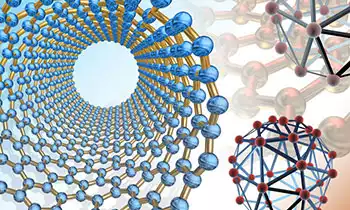NNCI Nanoscience Earth and Environmental Science Research Community Virtual Workshop
May 24-25, with optional 'Office Hours with Experts' on May 26, 2021
Days begin at: 11am ET/ 10am CT/ 9am MT/ 8am PT (Duration: 4 hours each day)
Workshop Overview

Workshop Goals
- Introduce the geoscience community to new advances and opportunities to do research in nanoscience through the National Nanotechnology Coordinated Infrastructure (NNCI) program.
- Help participants stay current about data, tools, services, and research related to nanoscience.
- Address the "big science questions" related to nanoscience: nanomaterials in the Earth system, impacts on biogeochemical processes, characterization of nanomaterials and their chemical properties at the nanoscale, impacts of nanomaterials (natural and incidental) on the environment and human health.
- Build collaborations; develop research networks to facilitate nanoscience research in the Earth and Environmental Sciences.
- Introduce education outreach efforts for nano-ES.
Who Should Attend
We welcome all colleagues who are nano-curious: Active researchers who would like to share their methods and results and obtain community feedback; geoscientists who would like to learn more about nanoscience and how they can participate; researchers who are looking to join information networks, initiate collaborative research or gain access to nanoscience facilities; faculty who would like to teach about nanoscience in their mineralogy, petrology or geochemistry courses; graduate students, post-docs, geoscience industry and government-based professionals.
Workshop Program and Format
This workshop will take place online, primarily through Zoom, and include a series of invited short talks and small working groups to investigate many dimensions of nanoscience in the Earth and environmental sciences. The workshop will be as interactive as possible in a virtual format. Participants will have access to our growing online resources on nanoscience in the Earth and environmental sciences; will have the opportunity to contribute ideas and resources to the workshop program and related collections; and will be encouraged to participate in continuing networked user groups to further develop nanoscience resources for use by the community. An introduction to nanoscience can be accessed at Teaching Nanoscience Across the Undergraduate STEM Curriculum.
Workshop Expectations
By registering for the workshop, participants agree to do the following, if accepted:
- Participate fully in the entire workshop and attend all workshop sessions during days 1 and 2.
- Review and follow SERC's Code of Professional Conduct for SERC Events.
Registration
Participation in the workshop is free, but we do require pre-registration to help our planning for the workshop and for our reporting requirements. Registration has closed.
Tentative Program
(Day 1: Monday) Theme: New Frontiers of Nanoscience Research in the Earth and Environmental Sciences
- Short talks about what nanoscience is and its applications; Confirmed speakers:
- Michael Hochella, VaTech and PNNL, Nanoscience Relevant to the Earth System
- Alberto Perez-Huerta, University of Alabama, Geosciences Applications of Atom Probe Tomography (APT)
- Michael Schindler, University of Manitoba, Nanoparticle Formation in Confined Pores Spaces
- Lilian Calderón-Garcidueñas, University of Montana, Environmental Nanoparticles and your Brain: What do you need to know right now.
- Arturo Keller, Univ. California, Santa Barbara, Nanomaterial Release in Air/Water/Soil and Impacts on Biota
- Russ Kelz, Program Officer, NSF/GEO EAR Instrumentation and Facilities
- Small group discussion sessions to explore challenges/needs/opportunities
(Day 2: Tuesday) Theme: Introduction to NNCI & Engaging the Community - Funding, collecting preliminary data, long term collaboration, sample preparation
- Overview of the NNCI -- Introduction from the National Office
- NNCI Earth and Environmental Sciences Research Community--The Vision (David Dickensheets, Trevor Thornton, Mitsu Murayama)
- NNCI Instrumentation available for community use (Dave Mogk)
- NNCI Education and Outreach Programs and Resources (Quinn Spadola, NNCI E and O, National Office)
- Introduction of Nanoscience "allies" from the Earth and Environmental Sciences community
- Breakout discussions to explore needs, how partners can help address those needs, and building connections beyond the workshop
(Day 3: Wednesday; Optional): 'Office Hours' with the Experts
- Networking opportunities for next generation research groups/communities; meet with NNCI representatives and lab managers to plan future research collaborations
Conveners
- David Mogk, MONT Montana State University
- Tonya Pruitt, NanoEarth Virginia Tech
- Paul Westerhoff, NCI-SW Arizona State University
- Kate Maher, nano@stanford Stanford University
Support Staff
- Monica Bruckner, SERC at Carleton College
Questions, Comments, Further Information?
Feel free to contact David Mogk: mogk@montana.edu


![[creative commons]](/images/creativecommons_16.png)
